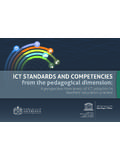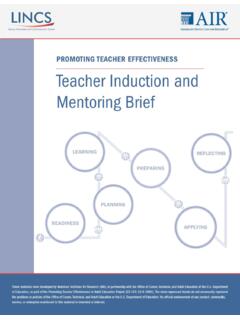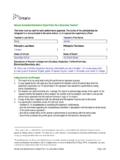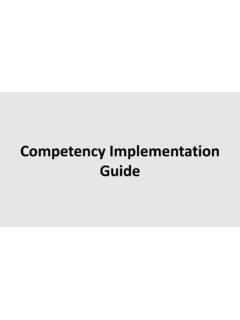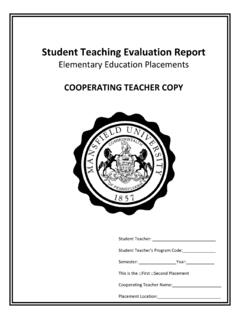Transcription of Characteristics and Competencies for Teacher Educators ...
1 Vol 36, 4, April 2011 Australian Journal of Teacher Education 73 Characteristics and Competencies for Teacher Educators : addressing the Need for improved professional standards in Turkey Servet Celik Karadeniz Technical University Turkey Abstract: Although a great deal of attention has been given to the nature of teaching and the qualities a good Teacher ought to possess, there has been little emphasis on the specific Characteristics and Competencies that Teacher Educators should have. This paper discusses whether setting explicit standards for Teacher Educators would help or hinder efforts to improve the quality of teaching about teaching, touching on the viewpoints of student teachers versus professional organizations regarding standards of quality and exploring the implied and explicit standards of academic institutions for language Teacher Educators in the and Australia, in comparison with the less-defined standards currently present in the Turkish educational system.
2 Introduction Significant research efforts in past decades have added a great deal to the body of knowledge about teaching and teachers. However, although the growing interest in trying to uncover the nature of teaching and teachers work over the years has brought attention to teaching about teaching, teachers of teachers who they are, what they do, what they think and their desired Characteristics , have often been ignored in studies of Teacher education (Lanier & Little, 1986). Correspondingly, questions such as What should Teacher Educators be competent in? What tasks and Competencies are Teacher Educators expected to possess? and ultimately What does it mean to be a good Teacher educator? have rarely been investigated (Koster, Brekelmans, Korthagen, & Wubbels, 2005). Therefore, not surprisingly, very little has been discovered about the quality of Teacher education, and hence, that of Teacher Educators , over the years (Buchberger & Byrne, 1995; Korthagen, 2000; Koster et al.)
3 , 2005). Teacher Educators are defined as people who provide instruction or who give guidance and support to student teachers, and who thus render a substantial contribution to the development of students into competent teachers (Koster et al., 2005, p. 157). They are the ones who are responsible for the quality of teachers, and, therefore, that of education. Thus, it is of crucial importance that the questions above are addressed by exploring what contributes to the professional development of Teacher Educators and by explicitly setting the quality requirements and specific Competencies for them. In this regard, the role of professional standards set or implied by academic publications, professional organizations, institutional guidelines for promotion and tenure, and other relevant sources should be highlighted, as standards are the main criteria by which performance and professional development of Teacher Educators can be assessed. Vol 36, 4, April 2011 Australian Journal of Teacher Education 74 standards : Good or bad?
4 The development of professional standards for teachers has been criticized over the years by several researchers; it is vital to disclose this criticism before the benefits of standards can be emphasized. A main point of criticism is the way standards are being developed (Zuzovsky & Libman, 2003). It can be claimed that Teacher Educators rights are violated and they are not valued as professionals if people from outside the profession generate a list of standards and impose it on them. Therefore, as Smith (2003) advocates, this group should be given an important role in formulating the content of the profile and standards for their profession. Another criticism is that standards usually do not take the complexity and unpredictability of teaching and learning into account ( , Korthagen, 2004). Some authors also add that too much emphasis is placed on standards as sole assessment tools, and that normative systems lead toward deprofessionalization ( , Cochran-Smith, 2001; Valli & Rennert-Ariev, 2002).
5 Correspondingly, some question the validity, reliability, and practical feasibility of assessments of Teacher Educators based on competence descriptions ( , Zeichner, 2005). It is believed there is then little incentive for these professionals to reflect on their own norms and values, as they have to rely on external rules. On the other hand, standards , if used properly, can provide guidelines for Teacher Educators themselves, for decision-makers, and for program designers, as well as serving as benchmarks for the assessment of Teacher Educators and their work. standards are an invaluable resource for professional development. As Ingvarson (1998) states, In a standards -based professional development system, standards provide a guide and a reference point to plan for personal professional development (p. 136). Even many who criticize the establishment of standards support the value of a professional profile for this reason (see Zuzovsky & Libman, 2003). Therefore, standards should be used as guidelines for work within a specific context and allow for individual routes to professional competence and growth (Crooks, 2003).
6 They should not, on the other hand, be aimed at creating an authoritarian assessment system (Ingvarson, 1998) that puts constraints on professional autonomy, inhibits professional creativity and development, and eventually erects a barrier to the quality of Teacher Educators and Teacher education. Overall, standards serve as a blueprint for training and evaluation (Smith, 2005) and help establish a knowledge base that will make public the Characteristics of Teacher education for people from both in and outside of the profession. What do professional organizations say? Numerous distinguished Teacher education organizations with decision-making power ( , accreditation or certification) have set standards applicable to Teacher Educators throughout the world. The Australian Institute for Teaching and School Leadership (AITSL) sets forth the Australian National professional standards for Teachers as endorsed by the Ministerial Council for Education, Early Childhood Development and Youth Affairs.
7 The National professional standards outline seven key elements for effective Teacher Educators (identified as lead teachers ), which are summarized below: Vol 36, 4, April 2011 Australian Journal of Teacher Education 75 Standard 1- Know the students and how they learn. Lead teachers are expected to select, develop, evaluate and revise teaching strategies to improve student learning using knowledge of the physical, social and intellectual development and Characteristics of students in order to meet the needs of students from diverse cultural and economic backgrounds (AITSL, 2011). Standard 2 Know the content and how to teach it. Lead teachers must be able to lead initiatives [..] to evaluate and improve knowledge of content and teaching strategies, as well as to monitor and evaluate the implementation of teaching strategies to expand learning opportunities and content knowledge for all students (AITSL, 2011). Standard 3 Plan for and implement effective teaching and learning.
8 Qualified lead teachers should demonstrate exemplary practice and high expectations [..] and lead colleagues to plan, implement and review the effectiveness of their learning and teaching programs (AITSL, 2011). Standard 4 Create and maintain supportive and safe learning environments. Lead teachers are expected to be active in the development of productive and inclusive learning environments, as well as to lead and implement behavior management initiatives (AITSL, 2011) in order to ensure students well-being. Standard 5 Assess, provide feedback and report on student learning. Lead teachers are required to evaluate school assessment policies and strategies to diagnose learning needs and to co-ordinate student performance and program evaluation using internal and external student assessment data to improve teaching practice (AITSL, 2011). Standard 6 Engage in professional learning. Lead teachers should initiate collaborative relationships to expand professional learning opportunities, engage in research, and provide quality opportunities and placements for pre-service teachers (AITSL, 2011).
9 Standard 7 Engage professionally with colleagues, parents/carers and the community. Lead teachers are expected to model exemplary ethical behavior and exercise informed judgments in all professional dealings with students, colleagues and the community, as well as taking a leadership role in professional and community networks and support[ing] the involvement of colleagues in external learning opportunities (AITSL, 2011). In the United States, several professional organizations the Association of Teacher Educators (ATE), the National Council for Accreditation of Teacher Education (NCATE) and the Teacher Education Accreditation Council (TEAC) have defined requirements for Teacher education faculty as set forth in Table 1 below. Vol 36, 4, April 2011 Australian Journal of Teacher Education 76 ATE NCATE TEAC Model the knowledge, skills, and attitudes reflecting the best available practices in Teacher education. Qualified faculty with earned doctorates or exceptional expertise; contemporary professional experiences in school settings at the levels they supervise.
10 Faculty accept the Inquiry Brief and that the preparation of competent, caring and qualified Educators is their own goal for the program. Research and contribute to one or more areas of scholarly activity that are related to teaching, learning, and/or Teacher education. Model best professional practices in teaching: Reflective or conceptual framework, incorporate appropriate performance assessments. Faculty accept the Inquiry Brief as demonstration of accurate and balanced understanding of the disciplines that are connected to the program. Inquire systematically into, and reflect on, their own practice and demonstrate commitment to lifelong professional development. Model best professional practices in scholarship. Faculty are qualified to teach the courses in the program to which they are assigned; Provide leadership in developing, implementing, and evaluating programs for educating teachers that embrace diversity, and are rigorous, relevant, and grounded in accepted theory, research, and best practice.










